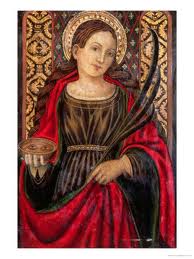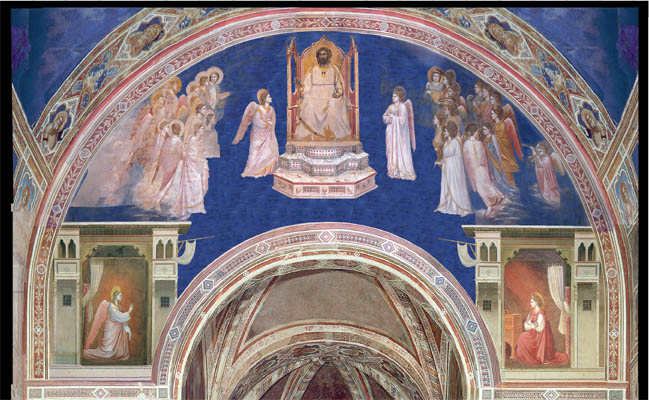Do you remember the little mnemonic poems? “Lenty, Penty, Crucy, Lucy”, or else
“Fasting days and Emberings be
Lent, Whitsun, Holyrood, and Lucie.”
The Wednesday, Friday and Saturday after St. Lucy are the Advent Ember Days.
In the old Julian calendar before the Gregorian reform, 13 December was the darkest day of the year. Hence, St. Lucy, whose name is from the Latin lux… “light”, reminds us who dwell in the still darkening Northern Hemisphere that our days will soon be getting longer again. Lucy is depicted in art with a lantern, or with a crown of candles, or with her own eyes on a platter. Some accounts have Lucy slain by having her throat thrust through with sword. Other accounts say that, to protect her virginity, she disfigured herself by cutting her own eyes out and sending them to her suitor, a plot which most likely discouraged him. St. Lucy is therefore the patroness of sight.
 St. Lucy shows up in important moments in Dante’s great Divine Comedy. She is first in the Inferno. It is Lucy who asks Beatrice to help Dante. In Purgatory the eagle that bears Dante upward in a dream is actually Lucy who is bearing him to the gate of Purgatory. Eagles, of course, are “eagle-eyed”. In the Paradiso she is placed directly across from Adam in the Heaven of the Rose. Lucy can gaze directly at God. She was something of a patroness for Dante. He was devoted to her probably because, as we glean from various works, he may have had a problem not just with his eyes but also struggling with sins of the eyes.
St. Lucy shows up in important moments in Dante’s great Divine Comedy. She is first in the Inferno. It is Lucy who asks Beatrice to help Dante. In Purgatory the eagle that bears Dante upward in a dream is actually Lucy who is bearing him to the gate of Purgatory. Eagles, of course, are “eagle-eyed”. In the Paradiso she is placed directly across from Adam in the Heaven of the Rose. Lucy can gaze directly at God. She was something of a patroness for Dante. He was devoted to her probably because, as we glean from various works, he may have had a problem not just with his eyes but also struggling with sins of the eyes.
The so-called “Golden Mass”, the Missa Aurea, is celebrated today. The illuminated missals and sacramentaries of centuries past presented the Gospel, or at least its initial capital letters, in gold, whence our nickname Missa Aurea. There is a strong Marian overtone to today’s Mass formulary. The Roman Station today is St. Mary Major. The Gospel is the Annunciation. The Gospel pericope begins Missus est angelus Gabriel. It was once celebrated with a solemnity nearly approaching a feast day. Thus, Missa Aurea also refers to little dramas in medieval times in which the Annunciation was acted out. It is thus not just “golden Mass” but “the golden sending“, which refers to the moment in which Our Lord becomes incarnate in the womb of the Virgin. Missa Aurea is used in the terminology of art history for paintings of the Annunciation, which often contain dramatic elements associated with the tableaux struck in the dramatic presentations of the mystery. Doves would be lowered and an old man would be placed in a loft wearing an alb and cope. Angels would be vested in dalmatics. Giotto’s frescoes in the 13th c. Arena or Scrovegni Chapel in Padua echo this tradition as do many paintings of the Annunciation.

And, since today is an Ember Day, we who recite the Office according to the Roman Breviary must during Lauds also say the Weekday Intercessions, which don’t come up on all weekdays.
Weekday Intercessions
Lord, have mercy upon us. Christ, have mercy upon us. Lord, have mercy upon us.
Our Father, who art in heaven, Hallowed be thy name. Thy kingdom come. Thy will be done on earth as it is in heaven. Give us this day our daily bread. And forgive us our trespasses, as we forgive those who trespass against us.
℣. And lead us not into temptation:
℟. But deliver us from evil.
℣. I said: Lord, be merciful unto me:
℟. Heal my soul, for I have sinned against thee.
℣. Turn thee again, O Lord; how long will it be?
℟. And be gracious unto thy servants.
℣. Let thy mercy, O Lord, be upon us.
℟. As we have hoped in thee.
℣. Let thy priests be clothed with justice:
℟. And may thy saints rejoice.
℣. Let us pray for our most blessed Pope N.
℟. The Lord preserve him and give him life, and make him blessed upon the earth: and deliver him not up to the will of his enemies.
℣. Let us pray for our bishop N.
℟. May he stand firm and care for us in the strength of the Lord, in the might of thy name.
In Rome, the preceding Versicle and its Response are omitted. Elsewhere, the name of the local Ordinary is inserted at the letter N. If the Holy See or the See of the local Bishop is vacant, the appropriate ℣. and ℟., either or both as the case may be, is omitted.
℣. O Lord, save our leaders.
℟. And mercifully hear us when we call upon thee.
℣. O Lord, save thy people, and bless thine inheritance:
℟. Govern them and lift them up for eve℟.
℣. Remember thy congregation,
℟. Which thou hast possessed from the beginning.
℣. Let peace be in thy strength.
℟. And abundance in thy towers.
℣. Let us pray for our benefactors.
℟. O Lord, for thy name’s sake, deign to reward with eternal life all who do us good. Amen.
℣. Let us pray for the faithful departed.
℟. Eternal rest grant unto them, O Lord, and let perpetual light shine upon them.
℣. May they rest in peace.
℟. Amen.
℣. Let us pray for our absent brothers.
℟. Save thy servants, O God, who put their trust in thee.
℣. Let us pray for the afflicted and imprisoned.
℟. Deliver them, God of Israel, from all their tribulations.
℣. O Lord, send them help from thy sanctuary.
℟. And defend them out of Sion.
℣. Turn us again, O Lord, God of Hosts.
℟. Show us thy face, and we shall be whole.
℣. Arise, O Christ, and help us.
℟. And redeem us for thy name’s sake.
℣. O Lord, hear my praye℟.
℟. And let my cry come unto thee.
Prayer {from the Proper of the season}
skip second ‘O Lord, hear my prayer’
Let us pray.
Grant, we beseech thee, Almighty God, that the solemn Feast of our redemption, which is now at hand, may both help us in the life which now is, and further us toward the attaining of thine eternal joy in that which is to come.
Through Jesus Christ, thy Son our Lord, Who liveth and reigneth with thee, in the unity of the Holy Ghost, ever one God, world without end.
℟. Amen.
Where is all this in the Novus Ordo?
(Trick question.)


































In the case of two Popes, can the Romans pray for both the Pope Emeritus and the Bishop of Rome? :)
Pingback: WEDNESDAY EXTRA | Big Pulpit
I’ve wondered…. Is it proper for the laity to use the Roman Breviary by themselves? It seems strange to pray the “Indulgéntiam…” when you are not a priest.
As a layman, I have been discouraged by my spiritual director from praying the Office, which he says is for priests, not laymen, and to do so would be to “clericalize” myself.
Surely it is good for laymen to pray the Divine Office–and misguiding for anyone to advise otherwise–as countless lay saints (and ordinary folks, lay religious and otherwise) have done down through the ages.
And why could not anyone–lay or clerical, Catholic or non-Catholic–pray (at any time, in the Office or otherwise) the petition of the Indulgéntiam… that “the almighty and merciful Lord may grant us pardon, absolution and remission of our sins”?
Henry Edwards: Because the removal of that prayer is what has caused certain sectors to claim that venial sins are not forgiven in the Ordinary Form. (NOT opening that rabbit hole here). Every place else (i.e., Confession / Mass) it seems reserved for the priest.
In the Baronius edition of the (1960) Breviarum Romanum, in the rubrics for Compline we see the following (in English translation):
“58. In the recitation by one alone, or when there is not a priest presiding, the Confiteor is said only once, by all together, thus: (bf emphasis added)
“Confiteor Deo omnipotenti . . . .
“Then follows:
“Misereatur nostri omnipotens . . . .
“Indulgentiam, absolutionem, et remissionem . . . . ”
[Evidently to be said by one alone or all together if no priest present.]
Thanks Henry Edwards!
My 1951 Small Roman Missal begins with “The Most Necessary Prayers”, including an English translation of the Confiteor complete with the Misereatur and Indulgentiam.
Wonderful at the beginning of the Commedia, the human chain let down from heaven: Our Lady sends St Lucy who sends Beatrice (Revelation) who sends Virgil (Reason) to rescue Dante from the dark forest of sin and error.
Don’t be a snowflake, Virgil tells Dante. Be bold! Tre donne benedette curan di te nella corte di cielo.
A loud and fervent AMEN to Henry Edward’s remarks. The Liturgy of the Hours (LOTH) is for EVERYONE! — be it in the Ordinary Form or the Extraordinary. The Western Church had a lay office for its first six centuries; the Eastern Church still does. See Daria Sockley’s book on the LOTH, and see her video on Vimeo.
arga, third order people are lay people and most of them pray the Office in one form or another. in fact most are required to though not under pain of sin.
Elements of those responses survive in Book of Common Prayer, Evensong.
John Donne: “Tis the yeares midnight, and it is the dayes,/Lucies,who scarce seven hours herself unmaskes”
As a footnote to the dubious claim that the Divine Office is not for laymen, only for priests, I might mention that the volume Officium Divinum–published by Angelus Press (SSPX associated) and explicitly targeting laymen praying the Divine Office–has the same rubrics directing laymen saying it alone or together without a priest present, to say the Indulgentium after the Confiteor at compline, as previously quoted from the Baronius breviary. And there is the Vatican II Sacrosanctum Concilium paragraph
100. ….. the laity, too, are encouraged to recite the Divine Office, either with the priests, or among themselves, or even individually.
So apparently Vatican II and the SSPX are united here at least, in urging the laity to pray the Divine Office. One can only wonder whence anyone might come up with the contrary advice.
Before St. John XXIII’s reform of the Breviary, these preces feriales were in fact said on all ferias of Advent and Lent at Lauds and Vespers; the “new code of rubrics” of 1960 restricted them to Wednesday and Friday. That same reform also eliminated the preces feriales, which had different forms, from the little hours of Prime, Terce, Sext, None and Compline. It also removed the preces dominicales from Prime. The beginning of the end!
Where is this in Novus Ordo?
Well every day of the year there are orations, both at Lauds and Vespers. Lauds are more “let us consecrate this day to the Lord and live in sanctity” oriented, while Vespers are more “universal prayer” oriented and thus, there are prayers for the Church, the pope, bishops, clergy, consecrated religious, all people of God, conversion of unbelievers (Jews too), help for those in various necessities and i could go on. Also, every Vespers oration includes a petition for the faithful departed.
So yeah. There it is in Novus Ordo.